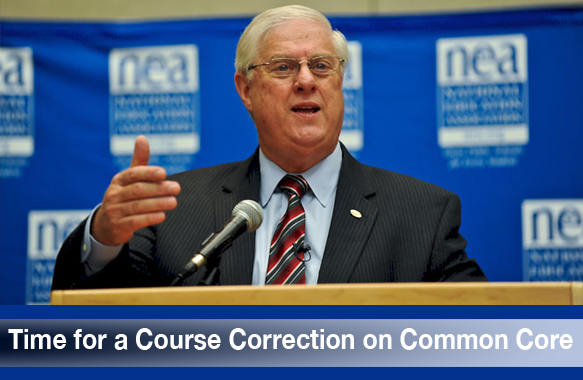By Lyndsey Layton E-mail the writer | Originally Published at Washington Post. February 19, 2014
The head of the nation’s largest teachers union said the rollout of the new Common Core academic standards has been “completely botched” in many states and that wholesale changes taking place in U.S. classrooms need an immediate “course correction.”
Dennis Van Roekel, president of the National Education Association, had been a steadfast supporter of the new K-12 academic standards that have been fully adopted by 45 states and the District since 2010.
But Van Roekel said Wednesday that after talking to about 10,000 teachers in listening sessions and focus groups over several months, he is convinced that implementation of the new standards in most of the country is chaotic.
“My greatest fear for the students of America is that we may lose the promise of the Common Core standards because we screwed up the implementation,” Van Roekel said.
Supporters of the Common Core say the standards emphasize critical thinking and analytical skills, as opposed to rote learning, and will enable U.S. students to better compete in the global marketplace. Education Department officials, in publicly supporting the Common Core, have said the standards are pushing communities and states to make long-needed improvements to their schools.
Nevertheless, dissatisfaction among the teaching ranks with the way the Common Core is being handled has built from a rumble to a roar, Van Roekel said. Seven out of 10 teachers the union surveyed said the switch to the Common Core was going poorly in their school districts, Van Roekel said.
In too many states, educators have not been given the training, time and classroom materials to properly make the shifts necessary to teach to the new standards, Van Roekel said. New curricula are being developed on the fly, and teachers lack textbooks and materials that align with the standards, he said. Most teachers say they have been shut out of the implementation process, Van Roekel said.
“It took us six years to develop the standards,” he said. “To think you can just roll it out, you can just do this without time, resources or support is crazy.”
Governors and state education officials need to slow down and work with teachers to help them thoughtfully enact the new standards, Van Roekel said.
Meanwhile, states are poised to administer annual standardized tests — as required by federal law — but new tests matched to the Common Core will not be ready until next spring.
That is forcing many states — including Maryland — to administer outdated examsin order to satisfy federal requirements to test every student in grades 3 through 8 in math and reading each year.
“It’s beyond me how anyone would ask teachers to administer tests that have no relation whatsoever to what they have been asked to teach,” Van Roekel said. “Why would you spend the resources and take the time away from instruction to do that?”
States should eliminate outdated tests that are not aligned with the Common Core, Van Roekel said.
He echoed an earlier call by Randi Weingarten, president of the American Federation of Teachers, for a moratorium on using new Common Core tests to evaluate teachers and make other accountability decisions for several years while schools transition to the new standards.
Though the Common Core has faced vocal opposition from political groups that characterize them as a federalized takeover of local education, and from academic groups that say the standards are either too lax or too challenging, Van Roekel made it clear that he still supports the idea of the standards.
“I’m saying it’s not working and we have to change what you’re doing, listen to the teachers and give them what they need to do this well,” he said.












Leave A Comment